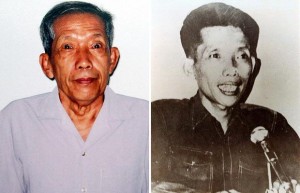Khmer Rouge Jailer Given Life After Appealing 30-Year Sentence
Khmer Rouge chief jailer given life sentence
By Staff
Al Jazeera
Kaing Guek Eav, better known as Duch, who oversaw deaths of 15,000 people in 1970s, has sentence increased after appeal.
A former Khmer Rouge jailer who oversaw the deaths of about 15,000 people will spend the rest of his life in jail, Cambodia’s UN-backed court has ruled in a final appeal verdict.
“The Supreme Court Chamber decides to impose a sentence of life imprisonment against Kaing Guek Eav,” said Kong Srim, president of the court’s highest appeal body, on Friday.
Kaing Guek Eav, better known as Duch, was sentenced to 30 years imprisonment in 2010 for crimes against humanity, and war crimes, over the torture and deaths of thousands of people at the notorious S-21 prison in the late 1970s.
“The crimes by Kaing Guek Eav were undoubtedly among the worst in recorded human history. They deserve the highest penalty available,” Kong Srim said.
Led by Pol Pot, who died in 1998, the Khmer Rouge was responsible for what has become known as Cambodia’s “killing fields”, which wiped out nearly a quarter of Cambodia’s population through starvation, overwork, and execution.
Clair Duffy, a human rights lawyer who is monitoring the prosecutions, told Al Jazeera that Duch’s sentence could prove problematic according to the law.
“Duch had been illegally detained by Cambodian military authorities for eight years, so the trial court actually gave him a five year reduction in his sentence in recognition of that fundamental violation of his rights, and today that was overturned by the majority of the judges on the appeals court,” she said.
“Ultimately, this is a court of law that is supposed to be applying international standards. This is not the Cambodian public putting Duch on trial here. These are judges who are not supposed to be swayed by public perception.”
Al Jazeera’s Stephanie Scawen, reporting from outside the court in Phnom Penh, described some of the atrocities committed at S-21 prison:
“Bloodletting was quite common… Others had their hands tied behind their backs and were strung up on exercise bars. When they went unconscious they would be dunked in water, and the process was started again. It was a horrendous regime.
“The court was very strong in repeating the gravity of the crimes that he committed,” she said.
‘Following orders’
S-21, also known as Tuol Sleng, was the centre of the Khmer Rouge security apparatus and thousands of inmates were taken from there for execution in a nearby orchard that served as a “killing field”.
Duch, 69, was the first Khmer Rouge cadre to face the international tribunal.
His trial attracted huge interest in a nation still haunted by the brutality of the regime, blamed for the deaths of up to two million people.
During his nine-month trial, Duch repeatedly apologised for his role at S-21, but surprised the court by asking to be acquitted at the 11th hour.
On appeal, Duch told judges that he only survived because he
“respectfully and strictly followed the orders”,
while his lawyers argued that their client should be released because he was
“just a minor secretary”.
Prosecutors said the shock request for a full acquittal showed Duch lacks remorse and demanded a life term, to be commuted to 45 years for time spent in unlawful detention before the court was established.
Duch has been held in detention since he was found working as a Christian aid worker in the Cambodian jungle in 1999. He was formally arrested by the tribunal in July 2007.
A second trial involving the regime’s three most senior surviving leaders opened at the court late last year, but there are fears that not all of the defendants, who are in their eighties, will live to see a verdict.
They are 85-year-old Nuon Chea, the Khmer Rouge’s chief ideologist and second in command; 80-year-old Khieu Samphan, an ex-head of state; and 86-year-old Ieng Sary, the former foreign minister.
They are accused of crimes against humanity, genocide, religious persecution, homicide and torture, and each claim no wrongdoing.
Source: Al Jazeera | Photo added by Haiti Chery
VIDEO: Pronouncement of life sentence (2 min).
Tribunal helps Cambodia confront its history
Mujib Mashal
Al Jazeera
Activists use attention around Khmer Rouge tribunal to further a national debate seen as crucial to social healing.
Despite questions and controversy surrounding the United Nations-backed tribunal, the recent trials of Khmer Rouge leaders have launched a robust public debate about the atrocities of the 1970s that analysts deem crucial to Cambodia’s reconciliation.

The high level of public participation in the trials is healthy for social healing, analysts say (Credit: EPA).
The Extraordinary Chambers of the Courts of Cambodia (ECCC) on Friday imposed a life sentence on Kaing Guek Eav, better known as Duch, the prison chief who oversaw the deaths of an estimated 15,000 people at Phenom Penh’s notorious S-21 prison, the centre of the Khmer Rouge security apparatus, in the late 1970s.
The ultra-Maoist Khmer Rouge, led by Pol Pot who died in 1998, were responsible for the deaths of nearly one quarter of Cambodia’s population through starvation, overwork, torture and execution.
Cambodian human rights activists called the verdict historic, but said the court’s legacy would depend on how it deals with the remaining cases.
“It contributes to the future of the country; justice is all about the future,”
said Youk Chhang, director of the Documentation Center of Cambodia (DC-CAM), a research institution archiving the events of the Khmer Rogue era.
“There is at least five million who survived the Khmer Rogue, and live today, and their children. It is not perfect timing, but it is not late.”
Khmer Rouge Trials
The ECCC initially sentenced Duch to 30 years imprisonment, factoring in his detention by military authorities from 1999 to 2007. Duch appealed the verdict, saying he should be acquitted because he was
“just a minor secretary”.
Hearing his appeal, the ECCC reversed the reduced verdict and handed Duch a life sentence.
“Today is quite historic for Cambodia and for our history. It is a long-awaited resolution for the victims of Khmer Rogue,”
Sopheap Chak, program director for Cambodian Center for Human Rights, said.
“While we welcome the final verdict, there are certain issues in relation to the rights abused of the accused as well.”
Clair Duffy, the Khmer Rouge Tribunal Monitor with the Open Society Justice Initiative in Phnom Penh, said there were “some real concerns” about how far the appeals court looked into the case before the final verdict.
“Ultimately, this is a court of law that is supposed to be applying international standards.This is not the Cambodian public putting Duch on trial here,” Duffy said.
“The first verdict of Duch, and the reduced sentence, gave a good example of how the right to fair trial should be, something that had been absent with the Cambodian court. But now, in the final verdict, that reduction has been removed,” Chak said.
Government interference
The tribunal has been marred for years by questions over government interference. A German judge quit in October last year, saying the government had told them
“that if investigating judges wanted to probe new cases, they should pack their bags and leave”.
Doubts have also been raised about the tribunal’s determination to go after other perpetrators after it issued a “closing order” that halted further investigation into suspects cited in documents known as Case 003.
The closure came without the judges interviewing witnesses or visiting the sites of the crimes.
“There has been known political influence and pressure on the court. I would say there is political influence on the whole process, but in the case of Duch, it was more loopholes than influence,” Chak said.
Chhang cautioned against looking at justice in terms of of how many accused are indicted, saying the focus should rather be on transparency.
“Justice should not be defined by the number of cases. I have not seen the government stop the investigating judge from investigating any case. But there must be really distinguished between politics and justice, and justice should not’t be bound by political pressure,” he said.
Public debate
Despite the challenges facing the tribunal, activists like Chhang have used the opportunity and the media attention to further open space for the discussion of the atrocities – a step they deem crucial for Cambodian society to move on.
“This court has brought about public participation and debate. The first verdict of Duch introduced an idea of fair trial to the public, and now there is a public argument about the right of fair trial for the accused, and his right to appeal,” Chak said.
The (DC-CAM), which Chhang leads, has provided the tribunal about 5,500 documents for its investigation. It has also brought in hundreds of victims and perpetrators to observe the tribunal process.
Analysts believe archiving and memorializing help a society heal from torment, accepting it as something of the past and moving on. To this end, the DC-CAM is building a national museum to
“uphold the memory of lost loved ones, foster resilience, and show the power of the Cambodian people to overcome the dark legacy of the Khmer Rouge terror”,
according to the museum’s website.
Funded by the US government, the museum’s design is complete and it awaits construction. Part of the museum will be housed in a school building that served as a prison under the Khmer Rouge regime.
The center has also been instrumental in gathering documents and oral histories from survivors for scholarly projects as well as for public decimation of the accounts.
Teaching history
Most importantly, the center has convinced the government to include a chapter on the Khmer Rogue regime in school history books.
“I think that the learning process is one of the best healing medicines in Cambodia,” Chhang said.
“It took the government almost nine years to approve a textbook of less than 100 pages,” he added.
The history of the regime was first taught in 2007, and today about one million students in grades 9-12 have a chance to study the era. Courses on the Khmer Rouge have recently been incorporated in universities nationwide .
The forward to the slim chapter on the Khmer Rouge era identifies the purpose the authors are trying to achieve by including it in the curriculum:
“Writing about this bleak period of history for a new generation may run the risk of re-opening old wounds for the survivors. Many Cambodians have tried to put their memories of the regime behind them and move on. But we cannot progress – much less reconcile with ourselves and others – until we have confronted the past and understand both what happened and why it happened. Only with this understanding can we truly being to heal.”
Still, teaching the curriculum has had its challenges.
“Even now that they allow teaching, we face so many challenges. Because every classroom that we go to, there is always children of the perpetrator or victim,” Chhang said.
“And the challenge we face by the parents of children who were Khmer Rogue in the past – they don’t like their children being taught this. Also, we have teachers who were traumatized, who were victims.”
Chak, the human rights activist, said the fact that teaching the subject remains divisive is reflected in the curriculum.
“The real history is not fully taught, it is just on the surface. There is a lot of facts that are not told,” she said.
Follow Mujib Mashal on Twitter: @mujmash
Source: Al Jazeera









I think the international Khmer Rouge tribunal is a farce at best. There is no way that trying five surviving members of the Khmer Rouge leadership will bring either justice or closure to the millions of innocent victims who have perished or are still reeling from their genocidal rule. I think the focus should be on education and raising awareness so that similar atrocities do not happen again.